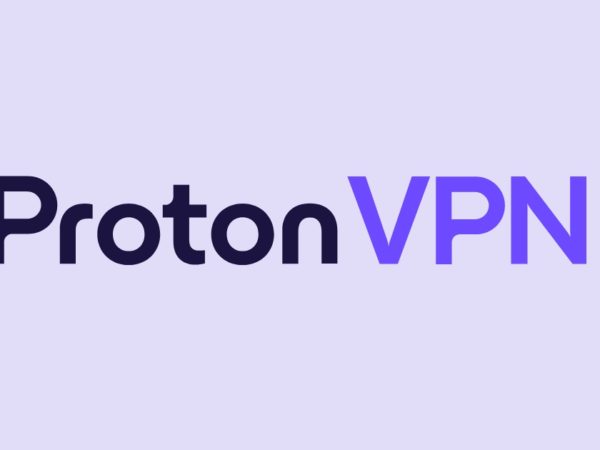<img alt="NordVPN vs ExpressVPN" data- data-src="https://kirelos.com/wp-content/uploads/2023/10/echo/NordVPN-vs-ExpressVPN-800×420.jpg" data- decoding="async" height="420" src="data:image/svg xml,” width=”800″>
A hands-on testing battleground to settle this once and for all: NordVPN vs. ExpressVPN.
Choosing among VPNs is never easy because every provider advertises their strengths: the things they can do, with no regard for what they can’t.
But the choice simply becomes an uphill task if the contenders are NordVPN and ExpressVPN. Both are excellent in their own might, and experts can’t recommend them enough.
Which one would you pick?
It’s confusing, I know. So, here is a detailed breakdown of their features and the real-life testing you need to figure it out.
NordVPN vs ExpressVPN
There are many aspects to any product review. The first thing we see is their claims—next, our experience. And the last one is other customers’ feedback. Combine these three, and you’ll get a clear picture of what will actually work.
Except for the online reviews, I will try to follow the same mantra. Here are the factors we will judge them against:
- Getting started
- User interface
- Security & Privacy
- Speed test
- Encryption test
- Streaming unlock
- Cross-platform support
- Value for money
Each section will have a winner, and we’ll tally the final score to see which one is better.
Let’s get the dice rolling.
Disclaimer: I’m testing these on my Windows 11 laptop. Besides, this is about personal use because ExpressVPN lacks a business variant.
Getting Started
NordVPN
One needs to enter an email address and choose from a wide range of payment options, including card, PayPal, Google Pay, and crypto (Bitcoin, Ethereum, and XRP).
I entered my card details to subscribe for a month.
The process went smoothly with this onboarding message:
At the installation, I was given a choice to opt for its password manager, NordPass. This has no additional payments. I guess this is because NordPass has a free tier.
Lastly, I logged into NordVPN with the registration email and set a password to begin.
ExpressVPN
Likewise, you can begin with ExpressVPN by entering your email address, name, and zip code (optional). The payment options were flexible, including card, PayPal, Bitcoin, and a few more.
I have gone with the card option, and for some reason, the first five attempts failed with two different debit cards (including the one that I used to buy NordVPN). Finally, all went with PayPal.
They give an activation code you can use to get going with their apps.
Surprisingly, you also get their password manager, ExpressVPN Keys, along with this purchase.
Conclusion: If not for that payment glitch, ExpressVPN has a more seamless onboarding with its activation code we can copy within the apps. In fact, you can also sign in to ExpressVPN apps with the registration email, like it was with NordVPN.
However, NordVPN was more flexible in crypto payments with three cryptocurrencies. And it was the faster of the two, with everything working perfectly on the first attempt itself.
Winner: NordVPN
User Interface
NordVPN
NordVPN UI looks modern and, I feel, can be a bit complex for some first-time VPN users. However, I would rate its UI the second most good-looking I’ve ever seen on any VPN (ProtonVPN is my first choice in this regard). This application also has an appearance option to theme the look: dark, light, or as per system.
The numbers on the map indicate the server count in each location.
I particularly like that you can connect to the specific servers (dedicated IP, double VPN, etc.) right from the home screen without scrolling down.
As a seasoned VPN user, this really comes in handy.
You can also easily pause the connection, reconnect, and check the IP address.
Overall, NordVPN impressed me with its user interface.
ExpressVPN
ExpressVPN, on the other hand, has an overtly simplistic dashboard, highlighting a huge connect button at the center.
Clicking the horizontal ellipsis opens up the server list. The arrow beside the locations indicated multiple servers in the same country.
We can mark servers as favorites, which helps us to locate them faster.
Everything else is stacked up inside the hamburger icon on the top left.
Conclusion: NordVPN has a great interface with dark mode, quick connection to specific servers, and things like connection pause. ExpressVPN, on the contrary, banks on a clean interface. You can mark favorites, something you cannot do with NordVPN. But that’s pretty much about it.
Again, I would give it to NordVPN just for the sheer number of things you can do on the home screen and the overall aesthetics.
Winner: NordVPN
Security & Privacy
NordVPN
You get two of the best VPN protocols with NordVPN. It’s one of the few VPN service providers to modify WireGuard to patch its inherent privacy issues.
Consequently, you get NordLynx (modified WireGuard) and OpenVPN (TCP and UDP). Based on your protocol choice, it can either use AES-256-bit (OpenVPN) encryption or ChaCha20 (NordLynx).
NordVPN recommends OpenVPN for the best possible security and NordLynx for speed-demanding tasks like online gaming. I agree with them, and you’ll hardly need anything else with these two protocols at your disposal.
Even so, you can set up IKEv2/IPSec manually if you frequently hop in and out of multiple connections because this protocol is particularly good at handling transitions. But it would’ve been better had NordVPN made this available within the app.
In an infrastructure upgrade, all “regular” NordVPN servers have been converted to RAM-only. This means nothing gets written on a hard drive. Everything gets erased, and the entire software gets reinstalled with every single server reboot.
This feature is crucial in two cases: first when a VPN company has to comply with the local law administration. And second, if a hacker tries to exploit your private data. In both cases, NordVPN won’t have anything that jeopardizes its users.
Next, you have its Trusted Wi-Fi network to avoid auto-connections on safe networks. It may seem like a small feature, but adding these little things is what makes a user-friendly product.
NordVPN encrypts DNS queries via its private DNS. Still, one has the option to use Custom DNS.
I would advise against using this option if you aren’t subscribed to a private DNS provider. Even then, it will be like adding another link to the overall security equation. Links are weak, so I suggest letting NordVPN handle your DNS queries.
Another important feature is the Kill Switch. NordVPN has this in two modes: one works for server-side technical issues, and the other disconnects whenever the VPN isn’t connected. In addition, there is a separate App Kill Switch, to close select applications whenever VPN connection drops.
Frankly, it’s one of the most advanced kill switches I’ve ever seen among top-tier VPNs.
Moving on, NordVPN offers an additional Threat Protection service at no extra cost. This can work with or without a VPN connection.
At the bottom, you’ll notice an unusual disclosure stating that by utilizing this threat protection, you are implicitly agreeing to their privacy policy and terms of service.
I mean, aren’t all users automatically agree to those when subscribing to their VPN?
So, check those policies to see if this has set any alarm bells ringing in your head. And if that’s too much of a task, let a dedicated premium antivirus program handle malware and internet security.
Its Split Tunnelling follows the same trend and presents two modes to operate.
This helps you selectively employ or exclude VPN encryption for specific, non-sensitive applications.
Furthermore, double VPN (routing traffic via two VPN servers), Tor Over VPN (additional Tor anonymity), and server obfuscation (hiding VPN encryption) make NordVPN security wholesome, with little left to be desired.
ExpressVPN
Quite similar to its competitor, ExpressVPN also offers two VPN protocols. However, the list is different this time. You get OpenVPN (UDP and TCP) and Lightway, a proprietary protocol it developed from scratch.
Generally, it’s good to develop a custom protocol if the code is secure and the implementation flawless. In this case, Lighway has been audited twice by Cure53, and this protocol is open source. In addition, this is just 2000 lines of code, which means fewer vulnerabilities and easy audition. Finally, it allows flexibility in choosing AES-256 or ChaCha20 as encryption ciphers.
Considering these facts, I, for one, have no doubts regarding Lightway.
ExpressVPN has its own private DNS servers. However, you don’t find anything to use a custom DNS, which is a minor let-down.
Its Kill Switch, again, has a basic mode that mostly works for server malfunctions.
ExpressVPN makes up for these with its TrustedServer technology. In simple words, these are RAM-only servers similar to what we have seen with NordVPN. Similarly, ExpressVPN also features malware and tracking protection in the form of a Threat Manager.
But again, this only works with the active VPN connection, unlike NordVPN, which has the option to let it function even when it’s not connected.
One thing where ExpressVPN has matched NordVPN’s flexibility is Split Tunnelling.
These are two modes to deploy VPN encryption selectively.
Conclusion: ExpressVPN has an excellent security atmosphere with its RAM-based server technology. Besides, its own 3rd-party audited Lightway protocol shows its commitment to user privacy.
NordVPN, on the other hand, has everything and more with custom DNS, a robust kill switch, Tor over VPN, Double VPN, and obfuscation. Its NordLynx protocol also puts it among the elite VPN clubs doing critical things in-house.
There were no IPv4 or DNS leaks with either.
Winner: NordVPN
Speed Test
Note: Every result is an average of two consecutive attempts, with the complete test done in a single sitting. I have selected NordLynx and Lightway (UDP) for this test as both were claimed to have been optimized for speed.
NordVPN
| S.No. | Server | Download Speeds (Mbps) | Upload Speed (Mbps) | Distance (Km) |
|---|---|---|---|---|
| 1 | Base | 86.23 | 48.59 | 0 |
| 2 | Singapore | 48.08 | 5.22 | 6,200 |
| 3 | London | 43.56 | 6.37 | 6,700 |
| 4 | New York | 39.75 | 3.41 | 12,000 |
| 5 | Tokyo | 43.01 | 5.36 | 6,200 |
ExpressVPN
| S.No. | Server | Download Speeds (Mbps) | Upload Speed (Mbps) | Distance (Km) |
|---|---|---|---|---|
| 1 | Base | 90.99 | 49.08 | 0 |
| 2 | Singapore | 47.35 | 23.35 | 6,200 |
| 3 | London | 44.00 | 6.17 | 6,700 |
| 4 | New York | 37.47 | 3.1 | 12,000 |
| 5 | Tokyo | 46.31 | 4.68 | 6,200 |
Conclusion: Except for Singapore upload speeds, I see no major difference in both. There was almost a 50% reduction in download speeds, and neither could help upload speeds from getting down to single digits.
Winner: None, it’s a tie.
Encryption Test
NordVPN
I connected with the NordLynx protocol and inspected data packets with Wireshark. The encryption seems to work fine covering DNS queries and everything else, except the ICMPv6 protocol revealed my real IPv6 address. Take a look:
Although they have stated about having an integrated IPv6 leak protection, the leak is there regardless. In the same blog post, you can read them saying completely disabling IPv6 addresses, which I believe is a better method to address this vulnerability.
I tried this myself by disabling IPv6 on my Windows laptop, and it worked. The leak wasn’t there.
To confirm, I also connected with OpenVPN TCP and UDP, and both instances leaked IPv6. Consequently, the only option is to disable IPv6 for your specific device.
ExpressVPN
ExpressVPN suffered from the same IPv6 leak issue with all of its protocols. This was the exact same finding I had during the standalone ExpressVPN review. The only difference is they have since removed an option that stated IPv6 leak protection, even when it wasn’t functioning optimally.
Now, like NordVPN, they also suggest deactivating IPv6 for better VPN protection. In addition, they say:
As IPv6 becomes more popular, we may consider running an IPv6-compatible VPN service in the future.
Source: ExpressVPN
Conclusion: Overall, both are good but reveal your IPv6 address, which you have to disable for complete peace of mind.
Winner: None, it’s a tie.
Streaming Unlock
NordVPN
The first one I tried was Netflix and NordVPN effortlessly unblocked all the international libraries in one go, such as the US, the UK, Canada, France, and Japan.
Specifically, I searched these shows, which were limited to the indicated locations as of this writing:
- US: Ferris Bueller’s Day Off
- UK: Rick and Morty
- Japan: The Promised Neverland,
- Canada: Pulp Fiction,
- France: The 400 Blows
Next, I logged on to BBC iPlayer. NordVPN, again, made quick work of the geo-locks in my first attempt with a randomly picked UK server.
My experience with Amazon Prime Videos was similar.
ExpressVPN
ExpressVPN was no less in giving me access to the restricted Netflix US, UK, Japan, Canada, and France libraries. I have opened the same shows as I did with NordVPN, and things went perfectly.
For BBC iPlayer, however, three of its four servers failed, with its Dockland server acting as a saving grace.
However, ExpressVPN had no issue sneaking through Amazon Prime geo-fencing.
Conclusion: ExpressVPN had some servers helpless against BBC iPlayer; I’ll still rank both of them equally in this regard because the choice of servers was absolutely random. Besides, this is a continuous struggle among the streaming platforms and the VPN service providers.
Winner: None, it’s a tie.
Cross-platform Support
NordVPN
NordVPN offers native applications for many platforms, including Windows, macOS, Linux, Android, Android TV, and iOS. In addition, you can get extensions for Chrome, Firefox, and Edge.
Moreover, NordVPN has guides about using their application on Xbox, PlayStation, Amazon Fire Stick, Nintendo Switch, Raspberry Pi, and more. Mostly, these tutorials depict installing an app, if available, or using VPN encryption by first getting it on a router and using the encrypted Wi-Fi afterward.
ExpressVPN
Likewise, ExpressVPN maintains a strong presence across devices and platforms. It has apps for major operating systems, such as Windows, macOS, Linux, Android, and iOS.
ExpressVPN also covers smart TVs and gaming consoles. However, it’s again pretty similar to what we have seen with NordVPN: install ExpressVPN on a Wi-Fi router and extend the benefit to the connected devices.
Additionally, ExpressVPN sells its own router, Aircove, which can help you connect your different devices to five different locations simultaneously. Needless to say, it comes with ExpressVPN built-in out-of-the-box. However, you’ll have to purchase the VPN subscription separately, without which it will function as any standard router.
In addition, this only works with ExpressVPN.
Aircover is available at Amazon and Flash Routers for purchase.
Conclusion: NordVPN and ExpressVPN both manage a robust cross-platform presence. And though ExpressVPN has its in-house router, it would have been great if it could support other VPNs as well. Therefore, I don’t think it’s that beneficial to get Aircove when you can get many VPN-preconfigured routers from e-retailers like Flash Routers.
Winner: None, it’s a tie.
Value for money
NordVPN
Monthly: $12.99
1-year plan: $4.99 per month
2-year plan: $3.79 per month
**These are NordVPN base plans for these durations. Higher plans also include a premium subscription to their password manager, data breach scanner, and 1TB encrypted cloud storage.
ExpressVPN
Monthly: $12.95
6-month: $9.99 per month
1-year plan: $8.32 per month
Conclusion: Not only is NordVPN more feature-rich than ExpressVPN, but it’s priced much lower (for a yearly subscription). Only the monthly tiers are priced roughly the same; otherwise, opting for ExpressVPN over NordVPN for longer durations simply doesn’t make sense, at least financially.
Winner: NordVPN
Target Audience
This is not for comparison but just to see their applicability.
NordVPN
NordVPN is for personal use, and it’s excellent at that. But they have branched out in NordLayer to extend the goodness to their enterprise customers. This is a cloud VPN that is extremely easy to implement to offer protection for the entire business network, users, and devices.
Consequently, you can opt for anyone, NordVPN or NordLayer, based on the use case.
ExpressVPN
As of now, ExpressVPN serves only individuals.
Unlike corporate VPNs, however, ExpressVPN is designed to protect the privacy of its individual customers, not the interests of any corporation, government, or other entity.
Source: ExpressVPN
This fact restricts ExpressVPN to personal users, with no version available for corporate customers.
Summary
| Factor | NordVPN | ExpressVPN |
|---|---|---|
| Onboarding | Seamless | Payment glitch with debit cards. Paypal worked. |
| UI | Modern with more features. | Basic kill switch for server-side problems. |
| Protocols | NordLynx and OpenVPN | Lightway and OpenVPN |
| Kill switch | Advanced with an additional app kill mode. | Basic kill switch. |
| Speed | Reduced download speeds to half. Uploads struggled even more. | Same as NordVPN. |
| Encryption | Leaks IPv6. | Same as NordVPN. |
| Streaming | Flawlessly unblocked Netflix, BBC iPlayer, and Amazon Prime. | Minor struggle with BBC iPlayer, but generally effective in unblocking streams. |
| Cross Platform Support | Extensive. Has apps for major platforms. | Same as NordVPN. Has a natively built router, too. |
| Value for Money | Lower price for longer subscription plans, more features. | Higher prices for longer subscriptions and fewer features. |
| Target Audience | Personal use. Extends to enterprise customers with its business offering, NordLayer. | Only for personal use. No corporate version is available. |
| Extra features | Malware protection, anti-tracking, ad blocking, double VPN, server obfuscation, dedicated IP, and Tor over VPN. | Malware and tracking protection. |
Who’s our Winner: NordVPN or ExpressVPN?
Personally, the result is clear as day. NordVPN won this battle 4-0 over ExpressVPN. Not to forget, four sections (out of a total of eight) had no winner, indicating ExpressVPN wasn’t a lightweight contender at all.
Just that, NordVPN has more to offer, and it’s priced way more economically.
Consequently, I will end this article by recommending NordVPN, hands-down.
PS: Still searching; you can also try my all-time favorite: Proton VPN.



